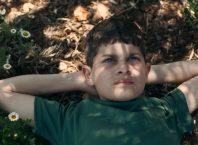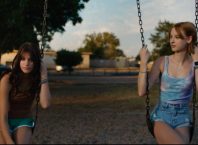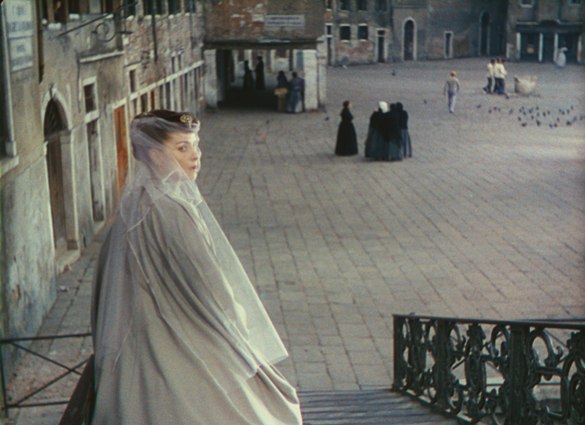
Seminal films from Europe will be shown at Israeli cinematheques beginning January 10, 2013 with Luchino Visconti’s Senso (1954). Film is a far more fragile medium than one tends to think, the preservation of films requires an investment of thought, effort and resources. Another Look: The Restored European Film Project, a collaboration of EU countries and their embassies in Israel – Italy, Ireland, the UK, Germany, Denmark, Spain, Poland, Portugal, the Czech Republic and France highlights European cinema and the issue of preservation, bringing ten films, one from each country, meticulously restored, to the Israeli screen at the Tel Aviv, Jerusalem and Haifa cinematheques. Project director and founder is Olivier Tournaud, the artistic director is Dan Chuytin, and it is produced by Nadav Noah.
The films are divided into two programs according to the following themes: Band of Brothers, cinematic attempts at defining a community in Europe; and From the Mouth of Babes, films featuring youth in situations that reflect social commentary. The films were selected with an eye towards offering Israeli audiences a better understanding of European culture, both past and present. The films will be screened with Hebrew subtitles, some will have subtitles in English.
The screening schedule and additional information may be found on the Another Look website, here.
The participating films, with information from the project catalog:
Band of Brothers: Defining a Community in Europe
France: Carnival in Flanders (Jacques Feyder, 116 min, 1935, B/W, English)
It is the year 1616, and Flanders is occupied by Spain’s conquering forces. The townspeople of Boom learn that the Spanish Duke d’Olivarès will shortly be arriving at their gates with his troops, and panic quickly spreads. In hopes of saving his city from the dire fate suffered by many other settlements in the region, the burgomaster asks the members of his community to play dead. This solution, however, offends his wife, who proposes instead to win over the hearts and minds of the Spaniards through a lavish feast. With the help of the town’s womenfolk, she will ultimately prove that a soft touch is often more helpful in resolving crisis than cowardly evasion or brutal invasion.
Ireland: The Rocky Road to Dublin (Peter Lennon, 67 min, English 1968)
In the late 1960s, Irish-born Peter Lennon, then a junior reporter for The Guardian, was sent by his newspaper to cover the Dublin Theatre Festival. Having been away from Ireland for several years, his old drinking pals made it a point to keep him up to speed on the transformations that have occurred in his absence. “Nobody pays any attention to the clergy and censorship is a thing of the past,” they exclaimed somewhat glibly. Yet for Lennon the changes did not seem so far reaching. Determined to offer a more sober view of Irish society, he decided to stay in Dublin and make a documentary “in which Ireland would condemn itself out of its own mouth”. With its clearheaded narration (by Lennon) and sensitive camerawork (by Raoul Coutard, long-time collaborator of Francois Truffaut and Jean-Luc Godard), the resulting film, titled Rocky Road to Dublin, offered a poignant portrait of a society burdened by the oppression of cultural isolationism and clerical traditionalism, but which still finds the will to strive for a brighter future. Rocky Road to Dublin will be screened together with the short documentary, The Making of Rocky Road to Dublin (Paul Duane, 2004)
Germany: Jadup and Boel (Rainer Simon, 103 min, 1980)
A small East German town is looking forward to its 800-year jubilee. Yet amidst celebrations, the traces of a dark past begin to surface. Particularly troubling is the memory of a young refugee, who resettled in the area with her mother in 1945. She was called Boel—a strange name, as outlandish as that of the present mayor, Jadup, who also landed in this corner of Germany around the same time. When the two first met, Jadup filled Boel’s heart with hopes of a bright future. Yet he could not protect her from the community’s scorn. When gossip spread that she had been violated by a Russian soldier, Boel kept silent, even in front of Jadup; and he, who failed to interpret this silence as a sign of love for him, would not stand by her side. Disappointed, the girl disappeared forever, and as years went by, Jadup gradually came to forget her. But now, when a stranger finds a book once given to Boel by Jadup, the longstanding mayor will be forced to confront his past and acquire a new critical outlook on his present surroundings.
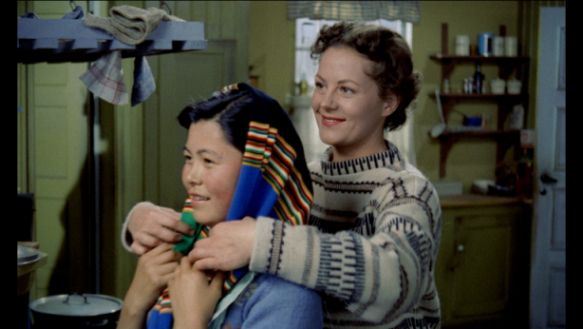
Denmark: Qivitoq (Erik Balling, 118 min,1956)
Eva Nygaard, a young Danish teacher, arrives in Greenland to surprise her fiancé, only to discover that he is about to marry someone else. Crushed, she travels to a small fishing village to await the next ship back to Denmark. While there, she becomes involved with Jens, the brooding Dane who oversees the local trading outpost. Jens finds it difficult to open up to Eva; in the meantime he is also preoccupied with persuading a Greenlander Inuit named Pavia to work as a fisherman for his company. Pavia agrees to the offer, despite fears of reprisal from the evil spirit Qivitoq. This decision will place him in harm’s way, but will also allow for the discovery of new emotional and communal bonds.
Italy: Senso (Luchino Visconti, 123 min, 1954)
During the Third War of Italian Independence, the beautiful countess Livia Serpieri, who is married to an Austrian sympathizer but supports Italy’s cause, falls in love with the dashing and irascible Austrian lieutenant Franz Mahler. Their affair brings her to the brink of scandal, yet Livia continues to surrender to her passion, even as suspicion grows that Franz may simply be toying with her emotions. This infatuation will subsequently lead her down a path of no return, where her personal and national loyalties will be tested and found wanting.
From the Mouth of Babes: The Challenge of European Youth
UK: This Sporting Life (Tony Richardson, 134 min, B/W, 1962)
Following a bar fight triumph, belligerent Yorkshire coalminer Frank Machin is recruited to play for the local rugby team. Frank impresses the team’s owner with his aggressive play, which includes brutally punching opposing players, and his professional future seems bright. Off the field, however, he finds little success. Frank lodges with a recent widow, with whom he frequently sleeps, but who fails to give him any real affection. Desperate for a sense of belonging, he attempts to win her over, thereby exposing an emotional wound which neither a woman’s love nor rugby success could hope to heal.

Spain: The Spirit of the Beehive (Victor Erice, 97 min, 1973)
Like many modern totalitarian regimes, Franco’s Spanish State purposefully used cinema to advance a false image of liberty and tolerance abroad. Yet in contrast to many other contemporaneous dictatorships, the result of this strategy was a string of experimental films that employed allegory and fantasy to disguise a radical anti-government critique. The most famous example of this so-called “Francoist aesthetic,” Victor Erice’s The Spirit of the Beehive is set to a remote village in the immediate aftermath of the Spanish Civil War. While their father is preoccupied with beekeeping and their mother writes letters to a non-existent correspondent, two young sisters, Ana and Isabel, are left to navigate the turbulent waters of pre-adolescence on their own. After a particularly inspiring screening of James Whale’s Frankenstein (1931), the two girls begin to introduce supernatural elements into their everyday games. Ultimately Ana, who is obsessed with a spirit that supposedly lives nearby, sets out one night to meet it, only to find a fugitive resistance fighter in its stead. The outcome for this encounter proves tragic for all, and becomes, in the words of critic Paul Julian Smith, a symbol for “the historical trauma suffered by Spain in the twentieth century.” Told through the eyes of a child, The Spirit of the Beehive thus offers a glimpse to the disillusionment suffered by Spain’s younger generation in the aftermath of the Spanish Civil War, as well as points to the potency of youth to transform discouragement into resistance.
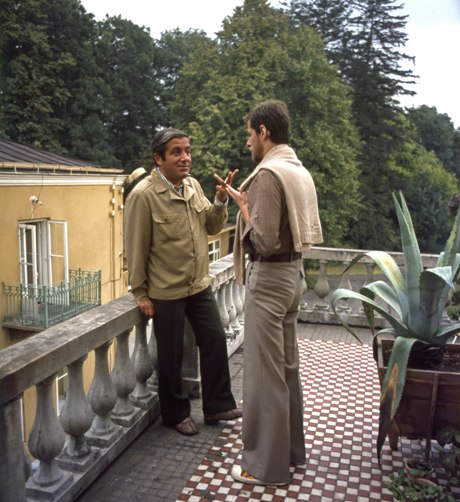
Poland: Camouflage (Krzysztof Zanussi, 102 min, 1977)
In the years leading up to the Solidarity Movement, preeminent cineaste Krzysztof Zanussi became increasingly preoccupied with the state of contemporary Polish morality. His films from the period, in turn, mirror this interest through their focus on characters which find themselves morally compromised by greater socio-political forces. Arguably the most impactful of these texts, Camouflage situates this ethical predicament in the academic world, which offers itself up as a thinly-veiled allegory for communist Poland. At the center of the film stands young Teaching Assistant Jarosław Kruszyński, who supervises a group of students during a university-sponsored summer camp for the study of linguistics. The principled Jarosław tries to advance a brash but innovative student by lobbying for his paper to win the camp’s essay competition. His attempts, however, are discouraged by senior professor Jakub Szelestowski, who recognizes that the paper’s radical views may not make it a suitable political choice for first prize. Confronted with the cynicism of his mentor on the one hand, and the idealism of his students on the other, Jarosław is thus forced to make a difficult choice, one whose implications go far beyond the realm of language study.
Czech Republic: Closely Watched Trains (Jirí Menzel, 93 min, B/W, 1966)
World War II is nearing its end, and at a sleepy railway station in occupied Czechoslovakia, young Miloš Hrma is taken on as an unpaid employee. While learning the trade, the childlike Miloš comes to know a few of the station’s residents and frequent visitors: the stationmaster, whose love for raising pigeons overshadows his professional aspirations; the train dispatcher Hubička, whose utter disregard for etiquette is only matched by his success at womanizing; the wayward telegraphist Zdenička, who lets Hubicka imprint her buttocks with the rubber stamps; and Councilor Zednicek, a Nazi collaborator who is obsessed with the safety of the Germans’ “closely watched trains.” The peculiarity of these characters does not seem to bother Miloš, nor does the war which seems so far away. Instead, what most preoccupies him is losing his virginity. Miloš’s journey towards sexual liberation will ultimately facilitate his maturation, but will also confront him with the broader social forces to whose existence he had been oblivious all along.
Portugal: Aniki Bóbó (Manoel de Oliveira, 71 min, B/W, 1942)
In Portugal of the early 1940s, two very young boys—the bold and daring Eduardo and the shy and kind Carlos—become enamoured with the same girl, the lovely Tereshina. The situation naturally leads to conflict, and as the rivalry unfolds, the volatile nature of their infantile universe becomes irrevocably exposed. Living on the streets, Carlos, Eduardo and the rest of their gang play their games, but these games are far from benign. Rather, they focus on survival, on weeding out the feeble from the strong, the desirable from the refuse. Emotion becomes a liability; compassion—a sign of weakness. And consequently, what is at stake in their struggles, as they navigate the troubled waters of their youth and draw nearer to the harshness of the adult world, is exactly the value of their innocence.

